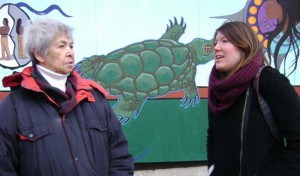Still a speaker after 60 years in city

By Barb Nahwegahbow
TORONTO – It was the late 1950’s when Mary Fox left her home on Wikwemikong Unceded Indian Reserve and set out for Toronto. She was 17 and, she recalls, “I hardly spoke English then, mostly Indian.”
A friend helped her find a job as a live-in housekeeper. “I didn’t know city life and at least I had a place to stay and they fed me,” she says. “It was an ideal situation for me.”
After three years, she moved on to waitressing at a Chinese restaurant. Fox has fond memories of her five years there. “They treated me like part of the family. When they had feasts or weddings, I was always included.”
Fox heard about a job opening for a keypunch operator at Imperial Oil. “I applied for it and lo and behold, I got it!” she says. In 1991, she retired after 28 years with the company after advancing to a position as Executive Assistant to one of the top managers. “They were good to me,” she says.“I loved it and I really and truly didn’t want to quit.”
Throughout her 60 years in Toronto, Fox has retained her first language, Anishinaabemowin. Conversations in Ojibwe are carried on with great ease and she is as fluent now as she was the day she left Wiky. She speaks her language every opportunity she gets.
“One time,” she remembers, “we started a social club at the Indian centre and met every week. We only spoke Indian, we didn’t speak a word of English. Our language is funny, it’s comical, and we used to laugh so much.”
Her commitment to the language and her community led the Native Women’s Resource Centre to honour Fox on April 10 with the Minaake Culture Keeper Award. In Ojibwe, Minaake means “people who are walking a good path”.
Fox is well-known in the community as a dedicated volunteer and crafts teacher. A diagnosis of Parkinson’s Disease four years ago hasn’t slowed her down. “I have to keep moving,” she says. “If I give up, then I’ll go all the way down. I need to see people because I enjoy people.”
She has taught others how to work with quills, beads and birchbark at the University of Toronto’s First Nations House, Ryerson University and Centennial College. Just a few months ago, she was invited by the Native Canadian Centre to teach quillwork to youth.
“It’s so important to keep the traditions alive,” Fox says. “The language is most important and it has to start from the home.”


